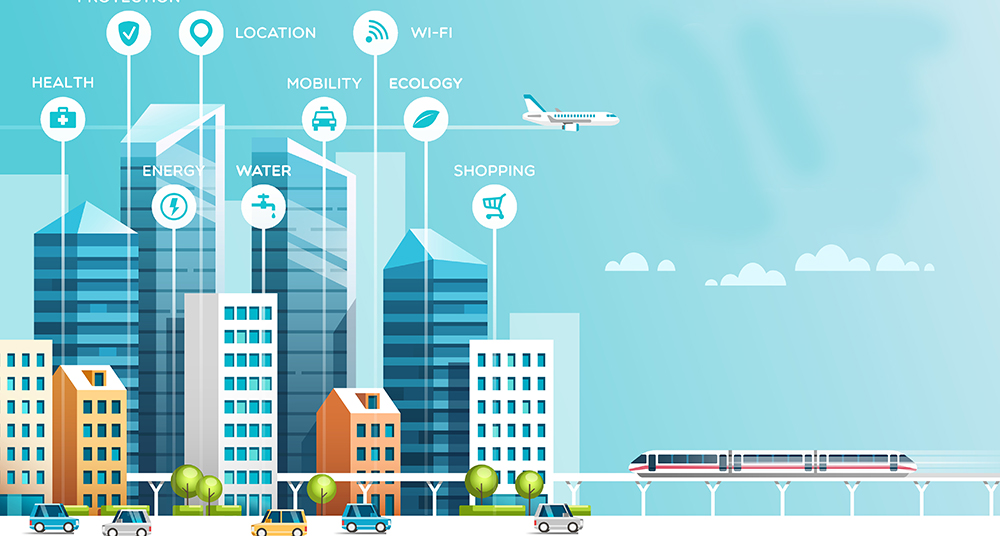
Smart city is a popular construction concept in recent years, yet regrettably the concept now focuses more on the technical construction of various information platforms and lacks attention to high-value content. The healthy development of the city in the future is worrying, especially as an extension of the information environment. What is the development benefit of the smart city for the city in the future? This is a problem worthy of attention to the prospect of the technology system.
Generally speaking, smart city refers to the integration of urban constituent systems and services with various information technologies or innovative ideas to enhance the efficiency of resource utilization, optimize urban management and services, and improve the quality of life of citizens. A smart city makes full use of the new generation of information technology in all walks of life in the city to build the advanced form of urban informatization based on the next generation of innovation in the knowledge society (Innovation 2.0). It realizes the deep integration of informatization, industrialization, and urbanization, which will help ease the "big city diseases", improve the quality of urbanization, refinement and dynamic management, and promote urban management performance and better quality of life.
The specific definition of the smart city tends to be generalized. The current smart city is widely defined internationally as a city form supported by a new generation of information technology and the next generation of innovation in a knowledge society (Innovation 2.0). It has been emphasized that smart city is not just the application of new-generation information technologies such as the Internet of Things and cloud computing, but more importantly, it is to build a sustainable urban innovation ecology characterized by user innovation, open innovation, mass innovation, and collaborative innovation through the methodological application of Innovation 2.0 oriented to the knowledge society. To put it simply, even if it is an extended definition, a smart city serves the technological development of a city.
In fact, the concept of the smart city originated from the idea of "Smarter Planet" proposed by IBM, and similar concepts such as the digital city. In November 2008, IBM released the report A Smarter Planet: The Next Leadership Agenda in New York, and put forward the concept of "Smarter Planet", which is to make full use of the new generation of information technology in all walks of life. At that time, IBM was so focused on urbanizing China that it moved the conference to China and held another one to introduce the concept of a "Smarter Planet" and smart cities. Chan Kung, the chief researcher at ANBOUND, was invited to the IBM conference.
From the perspective of the development process of smart cities, the construction of smart cities promotes sustainable economic growth and higher quality of life through investment in human and social capital, transportation and information communication infrastructure, and scientific management of resources and natural resources through participatory management. Some pioneering cities in the construction of smart cities are also increasingly highlighting people-oriented sustainable innovation. For example, the European Union launched the Living Labs plan for knowledge-based society innovation 2.0, which is committed to turning the city construction into an open innovation space for all parties to participate in the needs of citizens. The University of Vienna evaluates the urban system with six indicators, namely, smart economy, smart transportation, smart environment, smart residents, smart life, and smart management. As the construction of smart cities is essentially a kind of infrastructure investment, which can promote and stimulate economic growth, the construction of smart cities has increasingly become a hot issue in information technology, urban planning, and other fields.
For analysts, however, the key issue is the relationship between technical systems and the human environment. The idea of a "smart city" is the city's informatization environment construction. With the application of new-generation information technology, human beings can manage the state of production and life in a more sophisticated and dynamic way. Also, by embedding and equipping sensors and cameras into various objects of production and living systems such as power supply system, water supply system, transportation system, building and oil and gas pipeline, the Internet of Things formed can be connected with the Internet to realize the integration of human society and physical information system. From the perspective of this construction process, it is obvious that the current knowledge, understanding, and construction of a smart city focus on the city's information environment. However, cities are an important carrier and platform for human activities. This carrier and platform not only carry human activities, but also involve various types of urban assets, the most important of which is the digital assets of cities.
Digital assets are binary coded text or media resources that are authorized to be used, which include textual content, images, and multimedia. Digital assets include, but are not limited to, websites and their content, domain names, application software, code, electronic documents, image content, media content, e-currency, e-mail, game accounts, accounts and their content, social network accounts and their relationships and content, cloud service accounts and their data, etc. From an economic perspective, the digital assets are assets in the form of the data that are owned or controlled by society, enterprises, and individuals. Digital assets are also current assets and fixed assets produced, operated, held, or sold in daily activities. Digital assets belong to network property, but they are also extremely important historical and cultural assets. They are the content assets of the urban information environment. In addition to serving people, the most essential thing for a smart city is to be able to serve content, which is an important embodiment of the value of the technology system.
In today's modern information society, not only human wealth can be digitized, such as digital currency, but also human history, cultural wealth, as well as materials in libraries. In addition, cultural and artistic expression forms are also in the process of rapid digitization. These are valuable urban digital assets that will be relevant for generations to come.
In fact, the modern museum industry has included all kinds of new media art in its exhibitions. New media art is an art form based on the city of digital art, it includes audio, video art, electronic arts, computer art, network art, software, video game art, artificial life, video installation art, digital art, derivative, virtual reality, hackers art, super fictional art, performance art, robot technology, interactive art, holography and so on. These new media arts belong to the category of modern art that emerged after World War II. Exhibition halls, art galleries, museums, or specific venues around the world are actively exhibiting, forming a new art category and art trend, and leading people's fashion concept and consumption. They are both important components of urban digital assets and of smart cities. Therefore, for smart cities, we should not adopt a mechanistic attitude, ignore the most valuable cultural property, nor only pay attention to the operation and management of cities. Otherwise, the technological progress of smart cities can only serve the city administrators.
Therefore, it is the mission of ANBOUND to promote the integration of urban digital assets into the information environment construction of smart cities. We believe this is also an important direction of the construction of the smart city. It will enrich the most critical content platform of a smart city and continue the vitality of cultural digital assets in the digital age and the information age. Therefore, builders of smart cities should pay great attention to it.
It is perhaps to be expected that the smart city of the future will shine more brightly in culture, tourism, and urban value by using the city's digital assets as the flashpoint and value point. The smart city showcase will focus on the rich digital assets of the city rather than just the tedious technical systems for the masses. Only in this way can a smart city have the vitality of the information age and show real value and prospect.
With the progress of digital technology and its wide application in cities, smart cities will gradually turn from a concept into a reality. In this process, urban assets will change, and more and more digital assets will appear, which will become the new connotation of smart city and the shining point and value point of cities.
About the author: Founder of Anbound Think Tank in 1993, Chan Kung is now ANBOUND Chief Researcher. Chan Kung is one of China’s renowned experts in information analysis. Most of Chan Kung‘s outstanding academic research activities are in economic information analysis, particularly in the area of public policy.
Edited by
Ken Briodagh





